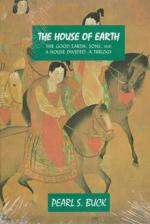|
This section contains 158 words (approx. 1 page at 300 words per page) |

|
Buck always sought to promote understanding of the world's peoples by stressing similarities rather than differences. Nowhere in House of Earth are Eastern or Chinese ethical values so different from those of the West that the reader feels alienated. Buck deliberately avoids an exploration of the Taoist, Buddhist, or Confucian perspective for this would maximize the foreign aspect of her Chinese characters for an American audience. Her commitment to the promotion of understanding in combination with her lively egalitarianism, so much in accord with Alfred Nobel's requirement that his prize go to "the best works of an idealistic nature," is essentially what won for her the Nobel Prize of 1938.
In this trilogy, which includes The Good Earth (1931), Sons (1932), and A House Divided (1935), the beleaguered Chinese peasant, perennially abused by overlords, warlords, landlords and government officials, wins her sympathy. This concern would remain central to her thought...
|
This section contains 158 words (approx. 1 page at 300 words per page) |

|




